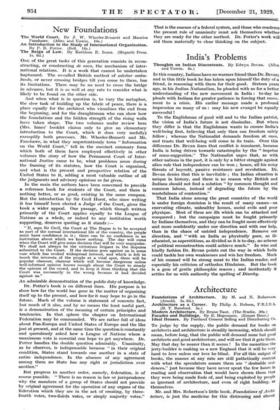India's Problems Thoughts on Indian Discontents. By . Edwyn Bevan. (Allen
and Unwin. 6s.) IN this country, Indians have no warmer friend than Dr. Bevan; and in this little book he has taken upon himself the duty of a friend, in reasoning with them for their good. Sixteen years ago, in his Indian Nationalism, he pleaded with us for a better understanding of the new movement in India : to-day he pleads with Indians for greater patience in forcing that move. ment to a crisis. His earlier message made a profound impression on many of us : may his new evangel be equally successful !
To the Englishman of good will and to the Indian patriot, the vision of India's future is not dissimilar. But where they differ is that the Englishman wants to ensure India's well-being first, believing that only then can freedom safely follow ; whereas the Nationalist demands freedom at once, and trusts that well-being will come in its train. Over this difference Dr. Bevan fears that conflict is imminent, because India is being driven towards catastrophe by the " impetus of mass-suggestion." The Nationalist urges that, as with other nations in the past, it is only by a bitter struggle against alien rule that independence can be won ; hence, all his noisy threats of boycott, passive resistance and revolution. Dr. Bevan denies that this is inevitable ; the Indian situation is unique in history, and there is no reason why British and Indians should not find a solution " by common thought and common labour, instead of degrading the future by the wastefulness of contention."
That India alone among the great countries of the world is under foreign dominion is the result of many causes—an enervating climate, unhealthy homes, social evils and poor physique. Most of these are ills which can be attacked and conquered ; but the campaigns must be fought primarily by Indians themselves, and they can be fought more effectively and more confidently under our direction and with our help, than in the chaos of untried independence. Remove our direction, and " with an India as physically poor, as ill- educated, as superstitious, as divided as it is to-day, no scheme of political reconstruction could achieve much." In wise and kindly fashion Dr. Bevan points out the way in which India could tackle her own weaknesses and win her freedom. Much of his counsel will be strong meat to. the Indian reader, and especially his criticism of orthodox Hinduism. But the book is a gem of gentle philosophic reason ; and incidentally it settles for us with authority the spelling of Diarchy.


































 Previous page
Previous page